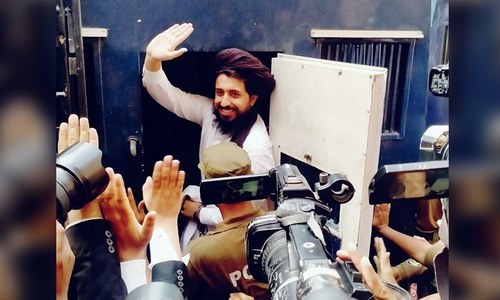• Proposed law would allow military, civil forces to detain such individuals for up to three months
• Envisions JITs that will conduct thorough inquiries and gather actionable intelligence
• Similar legal provisions had lapsed in 2016 due to sunset clause in post-APS legislation
ISLAMABAD: In a significant move, the government on Friday quietly introduced a crucial bill in the National Assembly, seeking to grant military and civil armed forces the authority to keep individuals facing terrorism charges in ‘preventive’ detention for up to three months.
Deputy Speaker Syed Ghulam Mustafa Shah referred the bill, which proposes amendments to the Anti-Terrorism Act (ATA) 1997, to the relevant committee for consideration immediately after Law Minister Azam Nazeer Tarar tabled it in the closing moments of a thinly attended session, without explaining its salient features.
The bill also includes provisions for establishing Joint Interrogation Teams (JITs) composed of members from various law enforcement and intelligence agencies to conduct inquiries. The same amendments to Clause 11EEEE of the ATA, introduced in the wake of the deadly terrorist attack on Army Public School in Peshawar, lapsed a decade ago due to a sunset clause.
According to the Statement of Objects and Reasons attached to the bill, the “erstwhile amendments of Section 11EEEE of the Act are required to be re-inserted to empower the government, armed forces and civil armed forces with the necessary authority to detain individuals who pose a significant threat to national security.
This provision would allow for the preventive detention of suspects based on credible information or reasonable suspicion, thereby disrupting terrorist plots before they can be executed“.
This amendment “will also provide law enforcement agencies with the legal backing to conduct more effective operations against terrorism. It would facilitate the use of JITs, composed of members from various law enforcement and intelligence agencies, to conduct comprehensive inquiries and gather actionable intelligence,” it said.
The bill recalled that Section 11EEEE of the ATA was amended in 2014, providing the government and authorised armed forces and civil armed forces with the authority to conduct preventive detention of individuals suspected of involvement in terrorism-related activities. However, this amendment was subject to a sunset clause, limiting its validity to two years, which expired in 2016.
“Further, the current security situation requires a robust response that goes beyond the existing legal framework,” the bill said.
The proposed clause in the ATA reads: “The government or, where the provisions of Section 4 have been invoked, the armed forces or civil armed forces, as the case may be, subject to the specific or general order of the government in this regard, for a period not exceeding three months and after recording reasons thereof, issue order for the preventive detention of any person who has been concerned in any offence under this Act relating to the security or defence of Pakistan or any part thereof, or public order relating to target killing, kidnapping for ransom, and extortion, bhatta or the maintenance of supplies or services, or against whom a reasonable complaint has been made or credible information has been received, or a reasonable suspicion exists of his having been so concerned, for purpose of inquiry.”
The amendment adds that “the detention of such persons, including detention for a further period after three months, shall be subject to the provision of Article 10 of the Constitution”.
A new proviso in sub-section (2) stipulates that if a detention order is issued by the armed forces or civil armed forces under sub-section (1), the inquiry will be conducted by a JIT comprising a police officer of at least superintendent rank and members from intelligence agencies, civil armed forces, and other law enforcement bodies.
According to the bill, these provisions will remain in effect for two years following the commencement of the ATA (Amendment) Act, 2024.
Standing committees
Earlier, Speaker Ayaz Sadiq warned that he would summon meetings of seven standing committees — already requisitioned by members to elect their chairpersons — if the opposition PTI failed to provide nominations by next week.
The matter was raised by Agha Rafiullah of PPP in response to PTI’s Asad Qaiser, who criticised the government over the absence of ministers during the question hour. Mr Rafiullah accused Mr Qaiser of point-scoring rather than genuinely working to empower the parliament, urging the opposition to submit committee member nominations promptly.
PTI Chief Whip Aamer Dogar assured the speaker that the remaining standing committees would be completed by next week. The speaker said he would wait until then, but if the process is delayed, he would call committee meetings next week to elect the chairpersons.
Opposition lawmakers on ECL
Responding to a calling attention notice on placing several opposition MNAs on the Exit Control List (ECL), Provisional National Identification List (PNIL) and Passport Control List (PCL), the law minister said a cabinet subcommittee conducts regular reviews of names on these lists in accordance with the 1981 law.
He advised opposition MNAs to formally submit a review request to the committee and provide their details to the ministry through the National Assembly secretary.
The minister claimed that around 65 to 70 per cent of requests for ECL removal are accepted. He explained that names are often added to the list due to absconding in criminal cases, with the ECL typically including around 4,000 individuals, mostly absconders.
Recalling the previous PTI government’s practice of placing opposition members on the ECL, the minister highlighted the current cabinet’s subcommittee’s efforts to remove names of former cabinet members now sitting in the National Assembly. He called for collective efforts to end the traditional practice of political victimisation.
The National Assembly will now meet again on Monday evening.
Published in Dawn, November 2nd, 2024












































